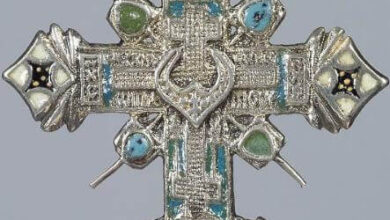
How the Prince Saw America by Susan Glaspell
They began work at seven-thirty, and at ten minutes past eight every hammer stopped. In the Senate Chamber and in the House, on the stairways and in the corridors, in every office from the Governor’s to the custodian’s they laid down their implements and rose to their feet. A long whistle had sounded through the building. There was magic in its note.
“What’s the matter with you fellows?” asked the attorney-general, swinging around in his chair.
“Strike,” declared one of the men, with becoming brevity.
“Strike of what?”
“Carpet-Tackers’ Union Number One,” replied the man, kindly gathering up a few tacks.
“Never heard of it.”
“Organised last night,” said the carpet-tacker, putting on his coat.
“Well I’ll–” he paused expressively, then inquired: “What’s your game?”
“Well, you see, boss, this executive council that runs the State-house has refused our demands.”
“What are your demands?”
“Double pay.”
“Double pay! Now how do you figure it out that you ought to have double pay?”
“Rush work. You see we were under oath, or pretty near that, to get every carpet in the State-house down by four o’clock this afternoon. Now you know yourself that rush work is hard on the nerves. Did you ever get rush work done at a laundry and not pay more for it? We was anxious as anybody to get the Capitol in shape for the big show this afternoon. But there’s reason in all things.”
“Yes,” agreed his auditor, “there is.”
The man looked at him a little doubtfully. “Our president–we elected Johnny McGuire president last night–went to the Governor this morning with our demands.”
The Governor’s fellow official smiled–he knew the Governor pretty well. “And he turned you down?”
The striker nodded. “But there’s an election next fall; maybe the turning down will be turned around.”
“Maybe so–you never can tell. I don’t know just what power Carpet-Tackers’ Union Number One will wield, but the Governor’s pretty solid, you know, with Labour as a whole.”
That was true, and went home. The striker rubbed his foot uncertainly across the floor, and took courage from its splinters. “Well, there’s one thing sure. When Prince Ludwig and his train-load of big guns show up at four o’clock this afternoon they’ll find bare floors, and pretty bum bare floors, on deck at this place.”
The attorney-general rubbed his own foot across the splintered, miserable boards. “They are pretty bum,” he reflected. “I wonder,” he added, as the man was half-way out of the door, “what Prince Ludwig will think of the American working-man when he arrives this afternoon?”
“Just about as much,” retorted the not-to-be-downed carpet-tacker, “as he does about American generosity. And he may think a few things,” he added weightily, “about American independence.”
“Oh, he’s sure to do that,” agreed the attorney-general.
He joined the crowd in the corridor. They were swarming out from all the offices, all talking of the one thing. “It was a straight case of hold-up,” declared the Governor’s secretary. “They supposed they had us on the hip. They were getting extra money as it was, but you see they just figured it out we’d pay anything rather than have these wretched floors for the reception this afternoon. They thought the Governor would argue the question, and then give in, or, at any rate, compromise. They never intended for one minute that the Prince should find bare floors here. And I rather think,” he concluded, “that they feel a little done up about it themselves.”
“What’s the situation?” asked a stranger within the gates.
“It’s like this,” a newspaper reporter told him; “about a month ago there was a fire here and the walls and carpets were pretty well knocked out with smoke and water. The carpets were mean old things anyway, so they voted new ones. And I want to tell you”–he swelled with pride–“that the new ones are beauties. The place’ll look great when we get ’em down. Well, you know Prince Ludwig and his crowd cross the State on their way to the coast, and of course they were invited to stop. Last week Billy Patton–he’s running the whole show–declined the invitation on account of lack of time, and then yesterday comes a telegram saying the Prince himself insisted on stopping. You know he’s keen about Indian dope–and we’ve got Indian traditions to burn. So Mr. Bill Patton had to make over his schedule to please the Prince, and of course we were all pretty tickled about it, for more reasons than one. The telegram didn’t come until five o’clock yesterday afternoon, but you know what a hummer the Governor is when he gets a start. He made up his mind this building should be put in shape within twenty-four hours. They engaged a whole lot of fellows to work on the carpets to-day. Then what did they do but get together last night–well, you know the rest. Pretty bum-looking old shack just now, isn’t it?” and the reporter looked around ruefully.
It was approaching the hour for the legislature to convene, and the members who were beginning to saunter in swelled the crowd–and the indignation–in the rotunda.
The Governor, meanwhile, had been trying to get other men, but Carpet-Tackers’ Union Number One had looked well to that. The biggest furniture dealer in the city was afraid of the plumbers. “Pipes burst last night,” he said, “and they may not do a thing for us if we get mixed up in this. Sorry–but I can’t let my customers get pneumonia.”
Another furniture man was afraid of the teamsters. For one reason or another no one was disposed to respond to the Macedonian cry, and when the Governor at last gave it up and walked out into the rotunda he was about as disturbed as he permitted himself to get. “It’s the idea of lying down,” he said. “I’d do anything–anything!–if I could only think what to do.”
A popular young member of the House overheard the remark. “By George, Governor,” he burst forth, after a minute’s deep study–“say–by Jove, I say, let’s do it ourselves!”
They all laughed, but the Governor’s laugh stopped suddenly, and he looked hard at the young man.
“Why not?” the young legislator went on. “It’s a big job, but there are a lot of us. We’ve all put down carpets at home; what are we afraid to tackle it here for?”
Again the others laughed, but the Governor did not. “Say, Weston,” he said, “I’d give a lot–I tell you I’d give a lot–if we just could!”
“Leave it to me!”–and he was lost in the crowd.
The Governor’s eyes followed him. He had always liked Harry Weston. He was the very sort to inspire people to do things. The Governor smiled knowingly as he noted the men Weston was approaching, and his different manner with the various ones. And then he had mounted a few steps of the stairway, and was standing there facing the crowd.
“Now look here,” he began, after silence had been obtained, “this isn’t a very formal meeting, but it’s a mighty important one. It’s a clear case of Carpet-Tackers’ Union against the State. What I want to know is–Is the State going to lie down?”
There were loud cries of “No!”–“Well, I should say not!”
“Well, then, see here. The Governor’s tried for other men and can’t get them. Now the next thing I want to know is–What’s the matter with us?”
They didn’t get it for a minute, and then everybody laughed.
“It’s no joke! You’ve all put down carpets at home; what’s the use of pretending you don’t know how to do it? Oh yes–I know, bigger building, and all that, but there are more of us, and the principle of carpet-tacking is the same, big building or little one. Now my scheme is this–Every fellow his own carpet-tacker! The Governor’s office puts down the Governor’s carpet; the Secretary’s office puts down the Secretary’s carpet; the Senate puts down the Senate carpet–and we’ll look after our little patch in the House!”
“But you’ve got more fellows than anybody else,” cried a member of the Senate.
“Right you are, and we’ll have an over-flow meeting in the corridors and stairways. The House, as usual, stands ready to do her part,”–that brought a laugh for the Senators, and from them.
“Now get it out of your heads this is a joke. The carpets are here; the building is full of able-bodied men; the Prince is coming at four–by his own request, and the proposition is just this: Are we going to receive him in a barn or in a palace? Let’s hear what Senator Arnold thinks about it.”
That was a good way of getting away from the idea of its being a joke. Senator Arnold was past seventy. Slowly he extended his right arm and tested his muscle. “Not very much,” he said, “but enough to drive a tack or two.” That brought applause and they drew closer together, and the atmosphere warmed perceptibly. “I’ve fought for the State in more ways than one,”–Senator Arnold was a distinguished veteran of the Civil War–“and if I can serve her now by tacking down carpets, then it’s tacking down carpets I’m ready to go at. Just count on me for what little I’m worth.”
Someone started the cry for the Governor. “Prince Ludwig is being entertained all over the country in the most lavish manner,” he began, with his characteristic directness in stating a situation. “By his own request he is to visit our Capitol this afternoon. I must say that I, for one, want to be in shape for him. I don’t like to tell him that we had a labour complication and couldn’t get the carpets down. Speaking for myself, it is a great pleasure to inform you that the carpet in the Governor’s office will be in proper shape by four o’clock this afternoon.”
That settled it. Finally Harry Weston made himself heard sufficiently to suggest that when the House and Senate met at nine o’clock motions to adjourn be entertained. “And as to the rest of you fellows,” he cried, “I don’t see what’s to hinder your getting busy right now!”
There were Republicans and there were Democrats; there were friends and there were enemies; there were good, bad and–no, there were no indifferent. An unprecedented harmony of thought, a millennium-like unity of action was born out of that sturdy cry–Every man his own carpet-tacker! The Secretary of State always claimed that he drove the first tack, but during the remainder of his life the Superintendent of Public Instruction also contended hotly for that honour. The rivalry as to who would do the best job, and get it done most quickly, became intense. Early in the day Harry Weston made the rounds of the building and announced a fine of one-hundred dollars for every wrinkle. There were pounded fingers and there were broken backs, but slowly, steadily and good-naturedly the State-house carpet was going down. It was a good deal bigger job than they had anticipated, but that only added zest to the undertaking. The news of how the State officials were employing themselves had spread throughout the city, and guards were stationed at every door to keep out people whose presence would work more harm than good. All assistance from women was courteously refused. “This is solemn business,” said the Governor, in response to a telephone from some of the fair sex, “and the introduction of the feminine element might throw about it a social atmosphere which would result in loss of time. And then some of the boys might feel called upon to put on their collars and coats.”
Stretch–stretch–stretch, and tack–tack–tack, all morning long it went on, for the State-house was large–oh, very large. There should have been a Boswell there to get the good things, for the novelty of the situation inspired wit even in minds where wit had never glowed before. Choice bits which at other times would fairly have gone on official record were now passed almost unnoticed, so great was the surfeit. Instead of men going out to lunch, lunch came in to them. Bridget Haggerty, who by reason of her long connection with the boarding-house across the street was a sort of unofficial official of the State, came over and made the coffee and sandwiches, all the while calling down blessings on the head of every mother’s son of them, and announcing in loud, firm tones that while all five of her boys belonged to the union she’d be after tellin’ them what she thought of this day’s work!
It was a United States Senator who did the awful trick, and, to be fair, the Senator did not think of it as an awful trick at all. He came over there in the middle of the morning to see the Governor, and in a few hurried words–it was no day for conversation–was told what was going on. It was while standing out in the corridor watching the perspiring dignitaries that the idea of his duty came to him, and one reason he was sure he was right was the way in which it came to him in the light of a duty. Here was America in undress uniform! Here was–not a thing arranged for show, but absolutely the thing itself! Prince Ludwig had come with a sincere desire to see America. Every one knew that he was not seeing it at all. He would go back with memories of bands and flags and people all dressed up standing before him making polite speeches. But would he carry back one small whiff of the spirit of the country? Again Senator Bruner looked about him. The Speaker of the House was just beginning laying the stair carpet; a judge of the Supreme Court was contending hotly for a better hammer. “It’s an insult to expect any decent man to drive tacks with a hammer like this,” he was saying. Here were men–real, live men, men with individuality, spirit. When the Prince had come so far, wasn’t it too bad that he should not see anything but uniforms and cut glass and dress suits and other externals and non-essentials? Senator Bruner was a kind man; he was a good fellow; he was hospitable–patriotic. He decided now in favour of the Prince.
He had to hurry about it, for it was almost twelve then. One of the vice-presidents of the road lived there, and he was taken into confidence, and proved an able and eager ally. They located the special train bearing the Prince and ordered it stopped at the next station. The stop was made that Senator Patton might receive a long telegram from Senator Bruner. “I figure it like this,” the Senator told the vice-president. “They get to Boden at a quarter of one and were going to stop there an hour. Then they were going to stop a little while at Creyville. I’ve told Patton the situation, and that if he wants to do the right thing by the prince he’ll cut out those stops and rush right through here. That will bring him in–well, they could make it at a quarter of two. I’ve told him I’d square it with Boden and Creyville. Oh, he’ll do it all right.”
And even as he said so came the reply from Patton: “Too good to miss. Will rush through. Arrive before two. Have carriage at Water Street.”
“That’s great!” cried the Senator. “Trust Billy Patton for falling in with a good thing. And he’s right about missing the station crowd. Patton can always go you one better,” he admitted, grinningly.
They had luncheon together, and they were a good deal more like sophomores in college than like a United States Senator and a big railroad man. “You don’t think there’s any danger of their getting through too soon?” McVeigh kept asking, anxiously.
“Not a bit,” the Senator assured him. “They can’t possibly make it before three. We’ll come in just in time for the final skirmish. It’s going to be a jolly rush at the last.”
They laid their plans with skill worthy of their training. The State library building was across from the Capitol, and they were connected by tunnel. “I never saw before,” said the Senator, “what that tunnel was for, but I see now what a great thing it is. We’ll get him in at the west door of the library–we can drive right up to it, you know, and then we walk him through the tunnel. That’s a stone floor”–the Senator was chuckling with every sentence–“so I guess they won’t be carpeting it. There’s a little stairway running up from the tunnel




